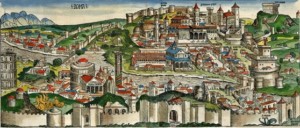ATHEISM IN REVERSE

In the previous issue of this periodical, we dealt with the development of Atheism, and the different ideological streams that were used to support its spread in the European landscape. In the beginning, the system of “Scholasticism” was set up ostensibly to help people find answers to the problems they had with their Faith, e.g. divine revelations, God’s grace, and other Christian teachings. The system appeared to support the existence of God, but without connection to the Church. The result was that history was distorted by “Relativism” (aligning teachings and dogmas to the concepts of the current society). “The Renaissance” with its spectacular scientific and technological advances, had a great effect on the masses, leading to the belief that science and not faith, are more important in life.
Soon the existence of God was seriously questioned, a view that quickly gained credence, some preaching that if there is no God, there is no immortality either, so man himself can be God. The most vocal and irrefutable argument against this irrational idea, was put forth by Dostoevsky: “God or nothing. Without the God of the Christians, we do not know the beginning or the end of things. Life is without meaning, because it would be without spiritual, infallible or eternal bases.”
The rationalist talks about problems, never about mysteries, the unknown or the unreasonable. Knowledge is control and the rationalist cannot believe that a man cannot have everything under his control. Nothing can escape the power of reason and logic. But reason and logic without God are impossible.
The societies of Western Europe found themselves in this spiritual poverty at the end of the 20th century. The people believed the atheists and the materialists, who then abandoned the people to fend for themselves. The people now appear to be in a state of confusion and without ideals that sustained them in the past. In the meantime, Immanuel Kant and Heinrich Haine (both German, philosophers, socialists, and friends), described the God of the Western spiritual civilisation, but such a God was not the God of Christianity, nor that of the Apocalypse.
After the Great Schism between the East and West, Christianity in the West during the Middle-ages became dominated by a synthesis of Roman law and Greek philosophy. In this deviation, it was Augustine who taught in the West the importance of paganistic philosophy, so that Christian theology would become more acceptable to the ordinary people, as paganism, a polytheist faith, was the religion of the peasants. Augustine was the one who changed the basis of theology from “apophatic” (negative), to “cataphatic” (positive), in fact to rationalistic theology. His theological ideas remained more or less dormant until the 9th century and continued till the 13th century. Thomas Aquinas was a strong supporter of Augustine and could only find minor errors in his theology. However, others later found significant problems with it.
The God of “cataphatic” (positive) theology, is not the God who became man. His ways and his thoughts are not like ours. We cannot know Him, just by talking about Him: “the knowledge of God is innate inside us, by virtue of our nature,” according to St John Damascene. When our inner self gets in touch with God (in prayer, Holy Communion or confession), we feel that God is above everything else, without beginning, or end, is unchangeable, without substance, cannot be seen, cannot be known, cannot be described, is eternal. As for Thomas Aquinas, his defence for the existence of God, consists of his “proofs”, or the “five ways”, being those which Plato and Aristotle used to teach their students.
The scandal of Western Roman Christianity is due to the fact that it is exclusive and unique, in addition to its demand that salvation exists only in the Church of Christ, and that the truth is the privilege of the selected. The condition of Faith and Divine knowledge cannot be perceived by the rest – they hear the words but they have no meaning, they see but cannot understand, and when shown the way, they derive no benefit.
The profane and the sacrilegious cannot have in their possession the holy treasure of the Living God.
Source: Lychnos October 2021 / November 2021
